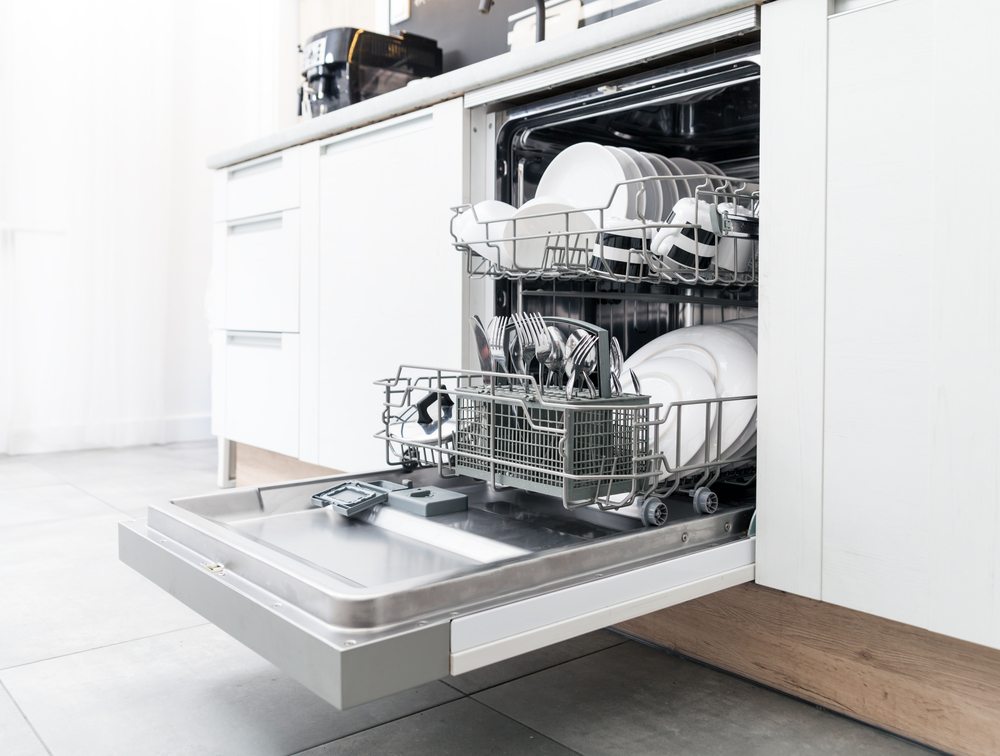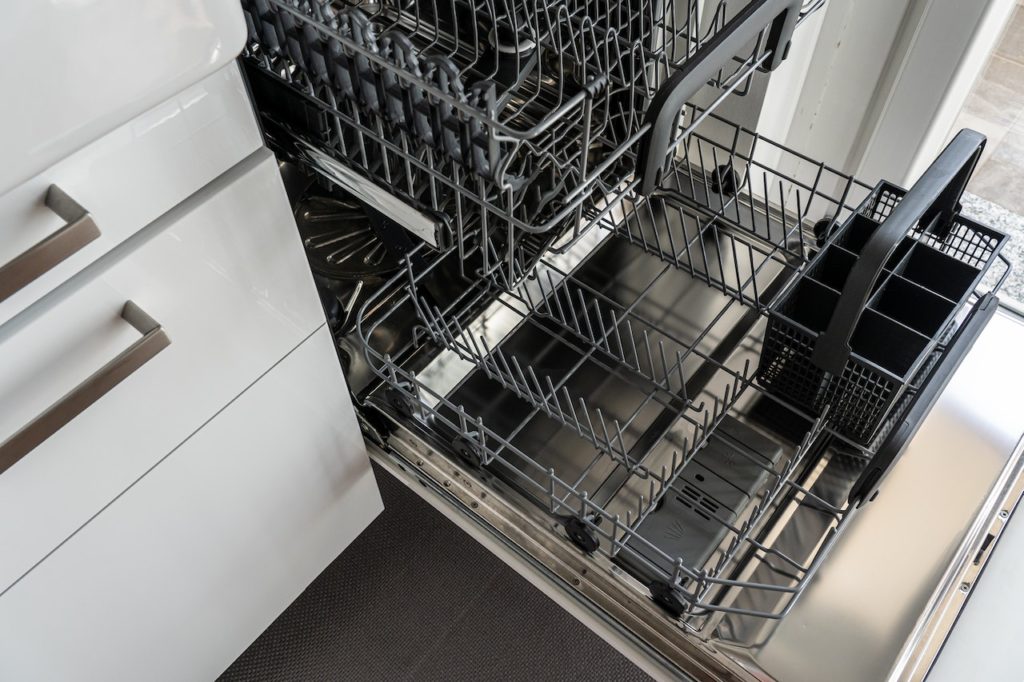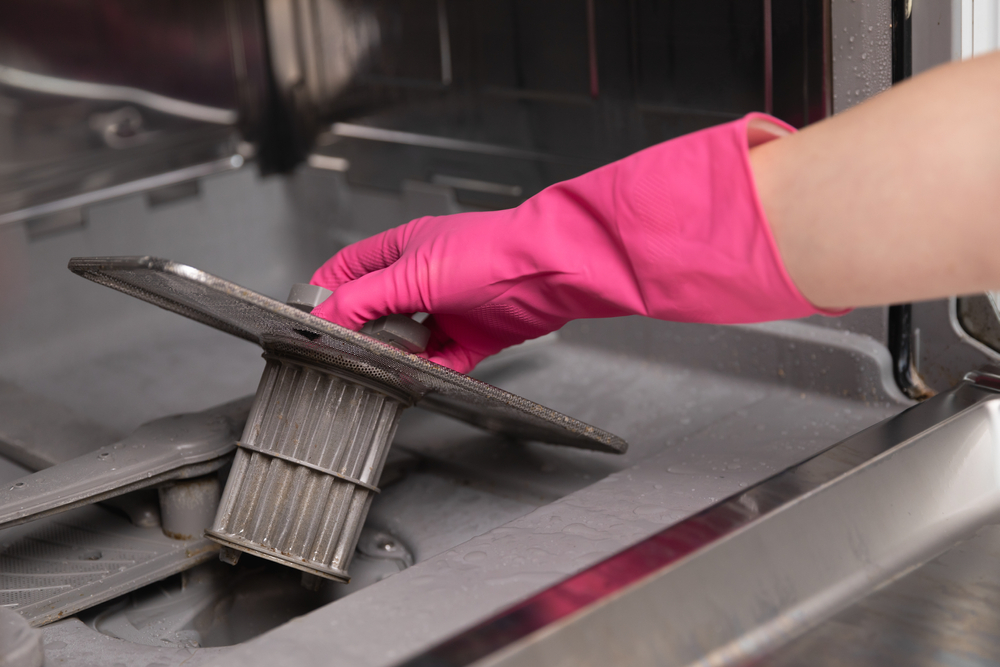
August 29, 2022
How to Clean Your Dishwasher in 4 Easy Steps
We use our dishwashers (almost) every day to make sure our plates and glasses get clean. But when was the last time you made sure your dishwasher itself was clean? If you’re like most people, this appliance gets forgotten in your cleaning checklist. But cleaning your dishwasher doesn’t have to be as hard as you may think.
Benefits of Having a Clean Dishwasher
Perhaps the most obvious benefit of a clean dishwasher is, well, clean dishes. If your dishwasher and its various parts are full of old food and other junk, you can bet that your dishes aren’t getting as clean as they appear. When your dishwasher is properly cleaned, though, you’ll have sparkling dishes every single time.
Having a clean dishwasher can also be beneficial to your health. Studies have shown that various kinds of bacteria and fungal pathogens can hang out in your dishwasher, presenting a potential health risk to you and your family. But when you clean your dishwasher regularly, those bacteria and pathogens will be taken care of, so you can rest assured your family is happy and healthy.
If you ever notice a funky smell in your kitchen, you might head straight for the trash can or the garbage disposal. But some of those smells might be coming from your dishwasher! Taking care of your dishwasher will reduce or possibly even eliminate bad smells in your kitchen. Plus, you’ll have a much lower chance of foul-smelling dishes well into the future.
Finally, just like any other appliance, your dishwasher appreciates regular maintenance. Dishwashers that are neglected could be at risk of limescale buildup and extra grease and grime. When you’re taking care of it properly and ensuring it gets a deep clean every now and then, you’ll extend the life of your appliance. Taking care of your current dishwasher is definitely cheaper than buying a new one!
How Often Should You Clean Your Dishwasher?

The next obvious question is: How often should your dishwasher truly be cleaned? In this case, it’s a matter of what level of “clean” you’re talking about. Additionally, if you have hard water, you might find that your dishwasher needs to be cleaned more often than these recommendations. Alternatively, if you don’t use your dishwasher every day, it may not need to be cleaned as often.
At the very least, you should be removing any visible food from your dishwasher every day. This task is easily done if you run your dishwasher at the same time each day. Sticking to a schedule will make it simpler to keep your appliance clean in general, and it only takes an extra minute or two each day. To make this task even easier, give your dishes a quick rinse before putting them in the dishwasher.
You should also take a few minutes once per week to do a bit more detailed clean. Clean the doors and the gasket to keep them clean and functioning. You should also remove the filter, found at the bottom of your dishwasher, and clean it as well.
Finally, most experts recommend deep cleaning the inside of your dishwasher once every month. This frequency will ensure your dishwasher stays clean without causing too much hassle in your cleaning routine. You can also clean the outside, edges, and inside of your dishwasher as needed if you notice excessive drips or dirt. For this step, you can use a paper towel or damp cloth.
How to Fully Clean Your Dishwasher
Cleaning your dishwasher doesn’t have to be a huge chore, but it does require a bit of attention. To begin, remove any visible foot and wipe down the door with a microfiber cloth. Using a gentle cloth will remove grime without damaging your appliance. You should also take out any removable parts, such as your utensil holder, and rinse or wipe them down until all food residue is gone.
Then, pull out the bottom rack of your dishwasher and locate the filter. Pull it out and rinse it under hot water in the sink. You can use a soft toothbrush to gently scrub the mesh, helping to remove extra food and grime that’s gotten stuck. Once the filter is clean, simply lock it back into the dishwasher.

In terms of cleaning solutions, brands like Cascade, Finish, and Glisten make cleaners that are simple and quick to use. If you’d rather use a DIY formula, you can work with vinegar and baking soda. Start by filling a glass with one cup of distilled white vinegar and putting it (with no lid!) on the top rack, then run a normal wash cycle. Once the cycle is done, sprinkle one cup of baking soda all over the inside floor of the dishwasher before running a short hot water rinse cycle. Finally, open the door and let the inside air dry.
A quick note: You can use bleach to clean your dishwasher, but only if it’s not stainless steel. Any stainless steel elements of your dishwasher could be damaged by bleach. If you do choose to clean with bleach, don’t combine it with vinegar or baking soda.
Read More: How to Clean Stainless Steel Appliances
Don’t forget the outside! You’ll want to, once again, use a microfiber cloth to clean the outer sections of your dishwasher, particularly if your appliance is stainless steel. You’ll get it clean and remove fingerprints without scratching or damaging the surface. If you find that a cloth and water isn’t enough, try using a bit of rubbing alcohol to remove those pesky prints.
Having a clean dishwasher is an easy way to keep your kitchen tidy and functional and ensure your family has sparkling clean dishes each day. But if you’re looking to deep clean your kitchen (or any other room in your home), consider working with White Glove Cleaner. We serve customers all over New York City and Manhattan and only employ professionally vetted and background-checked cleaners. Whether you need a one-time clean or recurring services, we’ll only use the best products and practices to get your home spotless. Contact White Glove Cleaner today to learn more!
